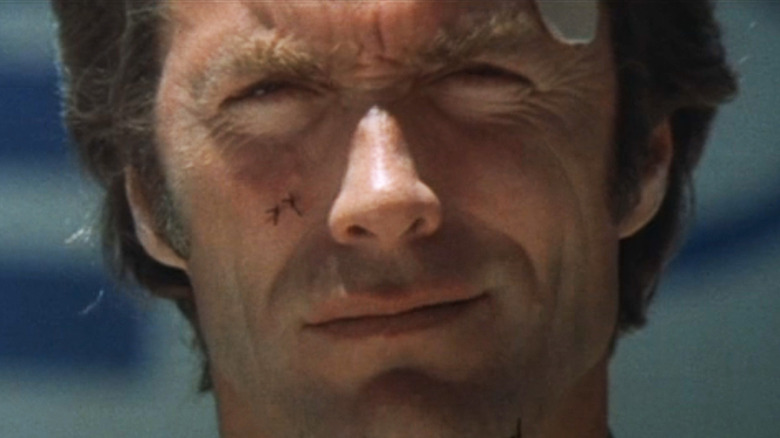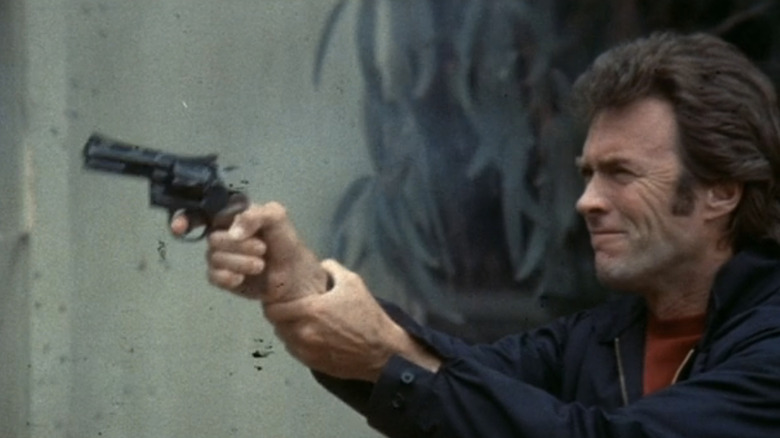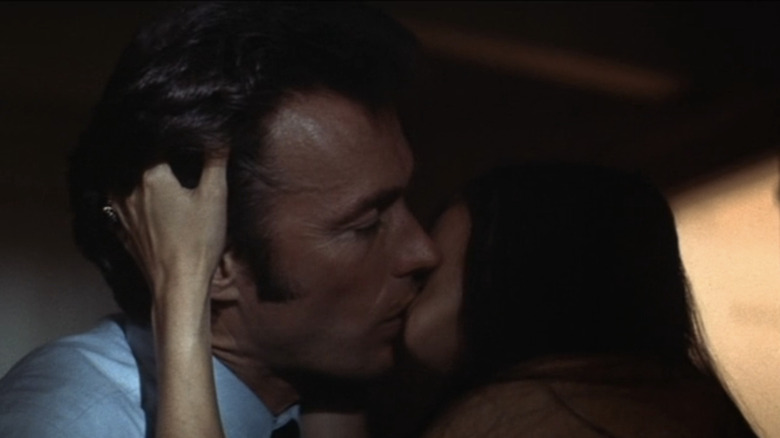The Writer Behind A Clint Eastwood Movie Found The Final Product Distasteful
"Dirty Harry" debuted in 1971 amid considerable controversy. Clint Eastwood's maverick cop Harry Callahan played by his own rules which simultaneously electrified and appalled audiences at the time. Director Don Siegel had, depending on your point of view, created a celebration of police overreach, a harmless action fantasy, or a grave warning against the dangers of flouting the rules in favor of one's own predilections.
In the film, Callahan tracks and apprehends the Scorpio Killer (Andrew Robinson), a serial murderer with his own predilection for shooting innocent people from rooftops. Eastwood's loose canon isn't exactly a stickler for the rules, and has no qualms about bending the law in order to get his man, thereby stoking the controversy that followed the film's release. But Siegel also made an effort to draw a parallel between the barbarity of the serial killer and Harry's own proclivity for violence. In time, "Dirty Harry" overcame accusations of being fascist propaganda to become known as one of the best films of the 1970s. The sequels, however, are a different story.
As Hollywood is wont to do, "Dirty Harry" was very quickly given the franchise treatment and Eastwood fronted four more films in the saga. 1976's "The Enforcer" aside, these follow-ups simply weren't all that great, and 1988's "The Dead Pool" represented a truly lackluster farewell for Harry Callahan, which is to say nothing of the canceled "Dirty Harry" videogame which got everyone's hopes up before never materializing. If you ask the co-writer of the first sequel, 1973's "Magnum Force," however, you'll hear about how this movie is the point at which everything went wrong.
The Magnum Force writer was surprised by the final film
"Magnum Force" saw the return of Clint Eastwood's Harry Callahan. For this second outing, "Dirty Harry" director Don Siegel was replaced by Ted Post ("Beneath the Planet of the Apes," "Go Tell the Spartans") and Harry's recklessness was very much overshadowed by the downright diabolical actions of the film's antagonists — almost as if co-writers John Milius and Michael Cimino were rebutting every critic who'd accused the first movie of being an apologia for police brutality. In reality, Milius wasn't that big a fan of the more shocking and violent aspects of the movie, which evidently hadn't come from him or his and Cimino's script.
The film saw San Francisco plagued by a group of vigilante cops who are even more reckless than Harry himself, violently executing criminals who've managed to evade lawful punishment. Harry obviously can't allow such violence to go on unchecked and begins investigating the group on a hunch that his former partner, Charlie McCoy (Mitchell Ryan) is involved.
Evidently, Milius wasn't a fan of how Post shot that story. In an article from a 1976 issue of Film Comment, the writer spoke to Richard Thompson and revealed that "Magnum Force" was his least favorite project. "Of all the films I had anything to do with, I like it least," he said. "They changed a lot of things in a cheap and distasteful manner." There's no doubt the criminality in "Magnum Force" was a lot more shocking and violent than it had been in "Dirty Harry," but there was also the fact that, according to Milius, large parts of the script had been changed entirely for the final film.
John Milius thinks Magnum Force strayed from the essence of Dirty Harry
In his Film Comment interview, John Milius revealed that large parts of "Magnum Force" didn't reflect the script he and Michael Cimino wrote. Of particular issue for the writer was the ending of the movie, in which Harry Callahan steals a motorcycle and leads officer John Davis (David Soul) on an extended chase through a shipbreaker's yard before Davis drives into the San Francisco Bay and perishes. According to Milius, this was totally different to what he'd crafted for the film's climax. "The whole ending is wrong," he said. "It wasn't mine at all. All movies had a motorcycle or car chase at the time — except Westerns."
But Milius also took issue with changes to the film that made the violence more explicit. "They have a scene where this black girl's pimp forces Drano down her throat." He recalled. "In the script, they merely went into the morgue and Harry said, 'I don't feel bad for that son of a b***h, 'cause two weeks ago one of his girls was in here and he'd poured Drano down her throat.' I think it's better to hear about it than to see it later." Milius also maintained that his tell-don't-show approach (the opposite of what a scenarist typically aims for) provided a better understanding of Callahan's point of view. "It goes right back to the character again," he added. "You understand Harry's feelings about it."
That wasn't all that rubbed Milius the wrong way. A scene in which Callahan sleeps with a woman also seemed to irk the writer, who told Richard Thompson, "My 'Dirty Harry' scripts never had Harry knowing any girls too well other than hookers, because he was a lonely guy who lived alone and didn't like to associate with people. He could never be close enough to a woman to have any sort of affair. A bitter, lonely man who liked his work."
Not only did "Magnum Force" stray from Milius and Michael Cimino's script, it strayed from what Milius thought Dirty Harry himself represented. It is true that "Magnum Force" isn't the finest of the saga and is a very different film to the first. But it also isn't without its charms. The supermarket battle is one of the greatest Dirty Harry moments in the franchise, there's a lot more focus on police work, and it was always great to see Clint Eastwood in one of his best roles. It also wasn't as controversial as the original, though Milius seemed as though he'd take the controversy if it meant the movie hewed closer to his vision.


